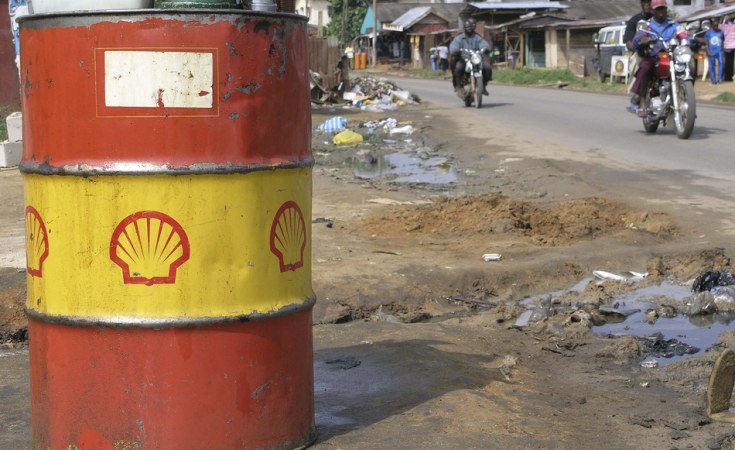London — Environmental and human rights activists are calling on the Nigerian government to withhold approval of plans by the London-based oil giant Shell to sell off its operations in the Niger Delta, unless the oil giant does more to tackle pollution in the region caused by the industry.
For decades, foreign energy firms have extracted hydrocarbons from the Niger Delta, and Shell is by far the biggest investor. It has earned the companies -- and the Nigerian government -- billions of dollars. Locals, however, have long complained of massive environmental damage.
"You can't grow crops. You can't drink the water. You can't fish because the fish are dying or they're dead," said Florence Kayemba, Nigeria director at the civil society group Stakeholder Democracy Network, based in Port Harcourt in the Niger Delta.
Shell Oil announced in January it is pulling out of its onshore and shallow water operations the region. It intends to sell its Nigerian subsidiary, the Shell Petroleum Development Company of Nigeria Limited (SPDC), to Renaissance, a consortium of five mainly local firms. The sale would include existing mining licenses and infrastructure. Shell says it is part of a plan to transition away from fossil fuels.
Civil society groups say Shell must do more to clean up the environment before it leaves. A recent report by a Dutch organization, the Centre for Research on Multinational Corporations, or SOMO, warned the divestment plan is a "ticking time bomb."
"Communities fear that, once Shell exits, they will never see their environment restored or receive compensation for lost livelihoods," the SOMO report said. "Most people in the Delta depend on farming and fishing, occupations that are impossible when the soil and waterways are deeply contaminated."
Florence Kayemba of the Stakeholder Democracy Network, which contributed to the SOMO report, told VOA that the Nigerian government must scrutinize the sale more closely.
"We are very concerned about the legacy of pollution being left behind by Shell -- not only Shell but also other oil companies that have divested their assets from the Niger Delta," she said.
"We believe that it's very important for the federal government to look into these issues, because the oil is not going to flow forever," Kayemba added. "You will have a post-oil Nigeria. You will have a post-oil Niger Delta. And we need to have an environment that is functional."
Oil companies like Shell have often blamed theft and sabotage for oil spills, a claim contested by environmental groups. Locals also seek to make money from unlicensed small-scale production known as "artisanal refining," according to Kayemba.
"What you have is a situation where artisanal oil refining is just reinforcing what has been happening," she said. "And yet that pollution had already existed. So, by the time you get to disentangle this, it becomes really difficult. Who is to blame who?"
A report commissioned in May 2023 by Bayelsa State, one of the major oil producing regions in the Niger Delta, estimated that it would cost some $12 billion to clean up decades-old oil spills in the state over a 12-year period. It blamed Shell and the Italian oil firm ENI for most of the damage.
Both Shell and ENI dispute the findings.
The SOMO report claims Shell is now selling its operations to domestic companies that may not have the capability to deal with the aging infrastructure and legacy of oil exploration.
"Shell is selling its oil blocks and infrastructure as going concerns to companies that appear, in several cases, to lack the finances and willingness both to deal with the old and damaged infrastructure and to undertake responsible closure and decommissioning when this becomes necessary," the report said.
"Shell's exit exposes the communities of the Niger Delta to major ongoing risks to their environment, health, and human rights, long after the oil industry ceases and likely for generations to come," it added.
In a statement to VOA, Shell said that "Onshore divestments by international energy companies are part of a wider reconfiguration of the Nigerian oil and gas sector in which, after decades of capability building, domestic companies are playing an increasingly important role in helping the country to deliver its aspirations for the sector."
"As divestments occur, mandatory submissions to the Federal Government allow the regulators to apply scrutiny across a wide range of issues and recommend approval of these divestments, provided they meet all requirements," the statement said.
Shell added that it will continue to deploy its "technical expertise" under the terms of the sale to the new buyers.
The Nigerian government has indicated it intends to approve Shell's divestment plans. Heineken Lokpobiri, Nigeria's petroleum minister, told the World Economic Forum in Davos that the government is committed to "fostering a business-friendly environment" in the sector.
"On the part of the government, once we get the necessary documents, we will not waste time to give the necessary considerations and consent," Lokpobiri said at Davos January 18, according to Reuters.
The Nigerian Ministry for Petroleum Resources did not respond to VOA requests for comment.


